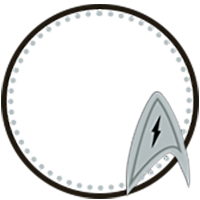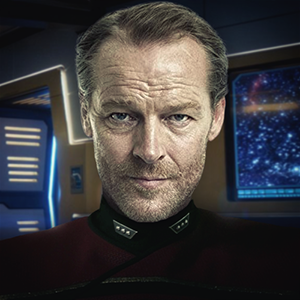The archaeology lab had been stripped of its usual clutter, as the Tempest’s favoured research space, and turned into something like a war room. Holographic maps and overlays hung in the air, nebula gas rendered in clouds of green and violet, the Glenmore’s telemetry streaking paths across it. Sorren prowled around the central console as if the shifting holograms might reveal their mysteries if he glared hard enough.
‘Over two centuries of advances in sensor technology,’ he muttered, ‘and Ketha’s Shroud’s still not much easier to navigate.’
‘No wonder Eurus-7 ran in there.’ Pentecost leaned against the edge of the table, arms folded. She wasn’t watching Sorren, but the old silhouettes listed at the periphery of the display, blocky starship outlines with hull numbers and names attached. ‘They didn’t come out here to fight.’
‘They were headed towards the Klingon border. They should have been ready to fight,’ Sorren pointed out.
‘The border was more ill-defined back then. It’s sometimes suited the Empire to treat vassalage on its furthest-out territories as… conditional. Extract resources and enforce rule when convenient. Leave them hanging when it’s not. The Federation thought this expedition was heading a good sector or two shy of Klingon space.’
‘Evidently the empire disagreed,’ he scoffed. ‘And even if they hadn’t, Starfleet knew about the dangers of the Borderlands.’
‘This was six ships in total,’ Pentecost said, nodding at the display. ‘A scout, two surveyors, three light cruisers. A charting expedition to push the Federation’s understanding of what was just beyond its space. There was no expectation the Klingons would be this brazenly territorial.’
She advanced and keyed commands on the control panel. The top-most ship silhouette moved and expanded to a full display of Eurus-7’s flagship, the Mercury, and beside her, a headshot of a steel-haired, middle-aged human woman in the uniform of a late-22nd century Starfleet captain.
‘Eugenie Malard was a veteran of the Romulan War. Battle honours aboard Pathfinder and Buran. Starfleet didn’t send some survey expert in charge of this expedition. They sent a warrior-scholar.’
Sorren hummed in the way she knew meant he disagreed but didn’t have a solid argument, so would express his disapproval. ‘I’m still trying to restore the full archives of the Glenmore’s logs; enough sections of the Belt encounter were accessible from the memory cache that recreating it was simple enough. Anything from before that…’ He waved a hand.
‘So we don’t know how the fighting started,’ mused Pentecost.
‘No. But we do know how it ended. Or, continued.’ The console chirruped at Sorren’s command. The display for Malard and the Mercury zoomed back out, and on the map of the local area and into Ketha’s Shroud, the Glenmore’s navigational logs expanded their path.
‘There.’ Sorren stabbed his finger at the tangle. ‘Extrapolation from the Glenmore’s last synchronised ping. The task group fled into this sector of the nebula.’
Pentecost tilted her head. ‘This looks like six overlapping haystacks.’
‘Which means we still need to find the needle.’
Only when the door slid open did Pentecost realise how much she’d lost track of time; this wasn’t an interruption, it was the scheduled arrival of their guests. Renard came first, stiff-backed and radiating discontent in that flat way of hers, shadowed by the two Klingons.
‘Captain.’ Renard sounded like she still resented babysitting. ‘Lieutenant Ash’rogh. Sergeant Jodrak. Lieutenant, Sergeant – Commander Sorren, and Captain Pentecost.’ Her introduction was perfunctory at best.
‘Glad to have you with us,’ Pentecost lied amiably. ‘You’re right on time. We’ve narrowed our search area to a specific sector of Ketha’s Shroud and were just going over records on the Starfleet task group.’
Ash’rogh opened his mouth, but it was Jodrak who gave a guffaw of delight and advanced on the central display.
‘Warp five-era engineering!’ he crowed, planting his hands on the console as his eyes soaked up the projection of ship outlines. ‘Starfleet design has never been so fine since. So pragmatic. Efficient.’
‘He means,’ rumbled Ash’rogh, ‘that he doesn’t understand your more sophisticated designs. Thank you for your hospitality, Captain.’ His eyes landed on the display, less impressed but far from dismissive. ‘So these are your ghosts.’
‘They could lead to our ghosts.’
He, too, advanced on the screen, though Pentecost saw the Klingon officer study the scans of the nebula, not the archives of ancient vessels. ‘This shroud eats ships. It has long been a thorn in the side of any who would control the sector; a gaping void in navigation and sight. You believe your sensors can see through it?’
‘Better than yours,’ said Sorren at once, and Pentecost heard his defensiveness. ‘Federation sensor arrays are considerably more sophisticated and sensitive, and Tempest is a science ship; she’s designed to manage stellar phenomena like this. We can compensate for interference your ship cannot.’
Jodrak laughed at that, though he looked amused rather than mocking, as if he thought Sorren had been making a joke. ‘You downplay your ship’s might, Cardassian! Her speed, her manoeuvrability, her weapons systems! She might challenge the Mat’lor!’
‘If all were equal, maybe.’ It was Ash’rogh’s turn to sound protective of his ship. ‘But not under Commander Kovor.’
Pentecost saw Renard roll her eyes behind them, and chose to respond with a crooked smile. ‘Hey, I’m an archaeology. He’s a Klingon warbird commander. I know my place. And my place isn’t to fight your ships – it’s to learn about an ancient fight.’
Ash’rogh settled at this with a begrudging nod. ‘Your Federation’s intrusion into our territory. You met the end you should have expected.’
Despite himself, Sorren looked pointedly at her. ‘That’s what I said.’
Pentecost sighed. ‘There was no formal recognition of these borders in those days. No indication from any Starfleet records that we anticipated the Empire would react with such territorialism to a foray into this sector.’
‘Not merely ignorance of our ways. A sign of how times have changed,’ allowed Ash’rogh, and lifted a hand towards the display. ‘May I?’ At Sorren’s reluctant nod, he reached to manipulate the holographic map, drawing it back out to beyond the Skaleri sector, but the immediate reach of the border.
‘In the 2170s, the nearest imperial garrison was here, in the Kordansk system,’ Ash’rogh explained, gesturing to a star system now more than a sector deep into Klingon territory. ‘That may be why your leaders naively thought this region unclaimed.’
‘Because you had a clear line where your infrastructure ended,’ Pentecost said, trying to keep her voice neutral. This was a chance to learn, and she knew she owed admirals dead for centuries neither deference nor defence.
‘Surely you know the era was marked by territorial expansion by the empire, in response to your nascent Federation?’ Ash’rogh frowned.
‘Under Chancellor Trovir. Who didn’t assume power until 2179.’
Ash’rogh shook his head. ‘Great Houses pushed Qo’noS for this expansion soon after your Federation was formed. The chancellor cared more for consolidating his own authority. Houses seized territory under their own autonomy over a decade and a half. Trovir assumed the chancellorship because of his support for this expansion, which he then formalised. Including expansion into Skaleri.’
Pentecost felt that fizz in her gut as he explained, the sense of pieces of culture sliding into place to paint a picture. ‘Starfleet stumbled into a frontier where Klingon houses were vying to stake a claim to prop up the empire and themselves, far further from official borders than expected.’
‘Our records indicate your task group was seen as interlopers, challengers for the region, and met accordingly,’ said Ash’rogh.
‘Fascinating,’ mused Sorren. ‘Not simply the cultural context. But that this kind of detail isn’t in our records.’
‘It’s not the kind of history the Empire traditionally shares with us,’ Pentecost told him. ‘Records and knowledge are often limited to local houses, rather than being the topic of centralised, institutional research.’ She inclined her head to Ash’rogh. ‘Which is why we need collaboration on this. For your knowledge of your own lands and people.’
Jodrak scoffed and elbowed Ash’rogh. ‘He read about this in the single hour before coming aboard. This is not an historian.’
Pentecost knew banter between soldiers, but she saw Ash’rogh stiffen, awkward – embarrassed. The lieutenant rolled a shoulder, stance tensing, and Jodrak at once dropped his arm, realising he’d misstepped.
‘I was instructed to lend assistance and represent the House of Mokvarn’s interests aboard your ship,’ Ash’rogh told Pentecost, colder now. ‘Of course I consulted our archives.’
‘It’s only sensible,’ Pentecost said, trying to stay neutral – not condescending, nor challenging.
‘What matters,’ Ash’rogh continued, still in that stiff, embarrassed way, ‘is that several houses were competing for Skaleri at the time. It was soon after claimed by the House of Pvarn, but many records suggest that an indulgence of the chancellor. That Pvarn did not seize it for themselves. The House of Mokvarn, however, played a key role in securing this sector. I am here to find evidence of our role in driving Starfleet interlopers out for centuries.’
There it was, Pentecost thought. The core of her Klingons’ guests motivation – or the motivation of their masters. Skaleri was contested anew, Pvarn’s claim gone. Kovor could do more than enforce law in the region in the name of the House of Mokvarn. He could prove that dominion of Skaleri was the heritage of his house.
‘What if you don’t find it?’ said Sorren bluntly, and Pentecost could have hit him. ‘We can’t promise any findings that say anything about Mokvarn’s role here. They may even undermine it. You’ve come to this research with an agenda, and that’s dangerous.’
Ash’rogh shrugged. ‘Everyone has an agenda. Do you claim yourselves to be neutral truth-seekers?’
‘The truth is just a matter of perspective, in history,’ Pentecost said amiably. ‘This is a mystery that needs solving. I don’t need that solution to be anything. I encourage you to keep open on this, Lieutenant. Not to brace yourself for disappointment, but…’ Her voice trailed off, and her eyes landed on the map, on the much smaller dot, now, of the nebula the locals called Ketha’s Shroud.
She smirked. ‘Open eyes see all manner of opportunities. Sometimes that’s the danger. Sometimes that’s the fun.’

 Bravo Fleet
Bravo Fleet








